There’s a common misconception that web-based CRM systems are only for large enterprises with massive customer databases. But in reality, startups and scaling businesses often benefit the most from a CRM that’s purpose-built for their unique workflows and customer interactions. In 2025, with so many off-the-shelf CRM options available, why build your own? The answer is simple: control, clarity, and alignment with your business goals.
At Aloa, we specialize in helping companies build high-impact, scalable software. We've worked with hundreds of businesses across industries to build everything from internal dashboards to AI-enabled CRMs.
In this guide, we’ll draw from that experience to show you how to plan, build, and scale a custom CRM that actually works for your business. We’ll cover common pitfalls, must-have features, and how to align your CRM with your long-term growth.
Let’s dive in.
Steps to Build a Custom Web Based CRM Software from Scratch
Developing a custom web based CRM software is a game-changer for businesses, blending tech with customer service. This guide offers a clear plan for building a CRM from start to finish. It aims to make the process understandable, lower risks, and deliver a powerful tool that fits your business needs.
Let's explore the critical phases of developing a system that will transform your customer management strategy to match the solutions provided by custom CRM development agencies.
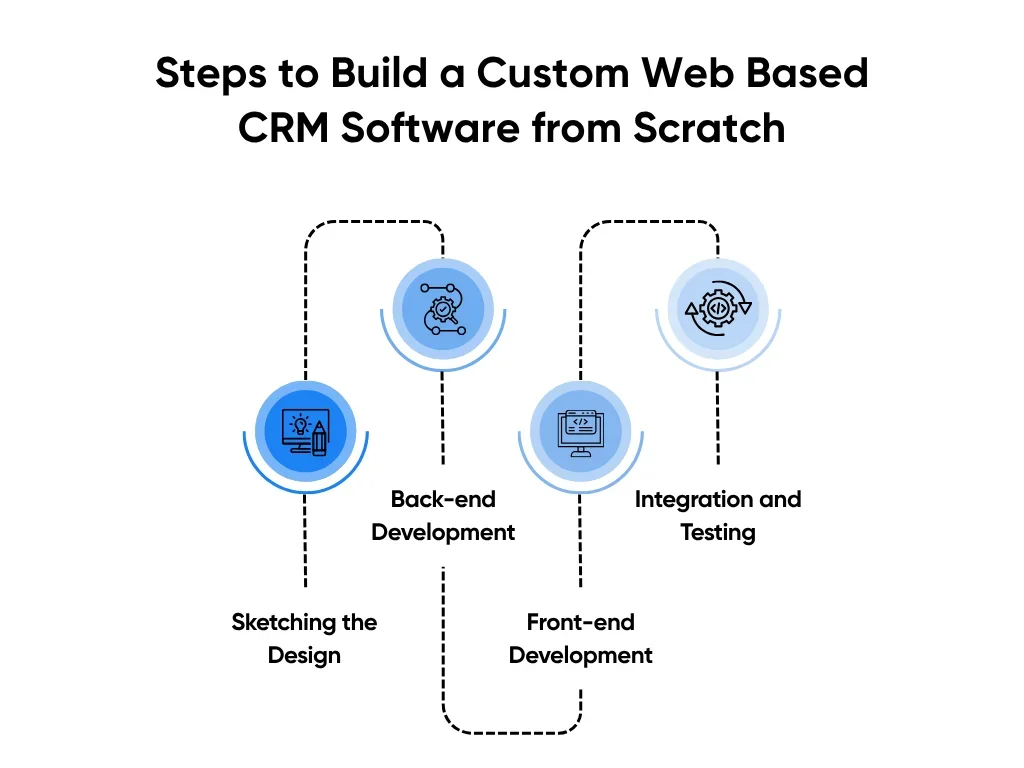
Step 1: Sketching the Design
To build a custom web-based CRM from scratch, you must start by creating wireframes and mockups of the user interface. These are the first drafts that will help you plan out easy navigation and simple forms for entering and showing data.
Remember to use your brand's colors and fonts here. It's also essential to ask for feedback from future users to improve your design. This step makes sure your interface is easy to use and understand.
By doing this groundwork, you're setting up a strong base for a CRM system that works well and helps users do their jobs better.
Step 2: Back-end Development
You'll also need to start with a solid data management system. This includes setting up ways to store, get, and update your customer information. You'll need to place the business rules, processes, and automated tasks that will run in the background of your CRM.
Ensure your CRM can sync data, update information in real time, and check that the data is correct. You'll want to ensure your database runs quickly, can handle the amount of data you have, and can grow with your business. Don't forget to test everything in the back-end to ensure it's reliable, stable, and keeps your users happy.
It's also crucial to have the right team in place and to pick the best CRM software platform that's the best fit for what your business needs, like Zoho CRM, HubSpot CRM, or others. You'll want your CRM to work well with any systems you already have and to include features that can help your business, like live chat, phone call options, and tools for marketing automation, provided you have a paid plan.
Step 3: Front-end Development
When creating the user interface for your custom web-based CRM, use the latest web development frameworks for a modern look and feel. Ensure your design adjusts smoothly to different screen sizes for the best experience on any device. Add interactive elements to keep users engaged. Keep your front-end code clean and organized by sticking to best practices.
And before you launch, test it on various web browsers to ensure it works well everywhere. Follow these steps for a front-end that's not just good-looking but also works great and is easy to use.
Step 4: Integration and Testing
At this stage, it's crucial to integrate the front-end and back-end of your web-based CRM to make sure they work together without a hitch. This is where thorough testing comes in—to check every feature and interaction works just as planned. You'll want to have solid error handling and debugging strategies in place to fix any problems quickly.
It's also essential to validate all your data thoroughly to keep it consistent and accurate. Plus, don't forget to test how well the system performs and if it can handle growing numbers of users or data, including advanced features. This ensures your CRM will smoothly run when it's being used in the real world by getting the information to the right people at the right time.
Key Features of a Custom Web Based CRM for 2025
Starting the development of a custom web-based CRM requires a clear understanding of the essential components that will serve as its foundation. These elements are the operational core of your customer relationship management system.
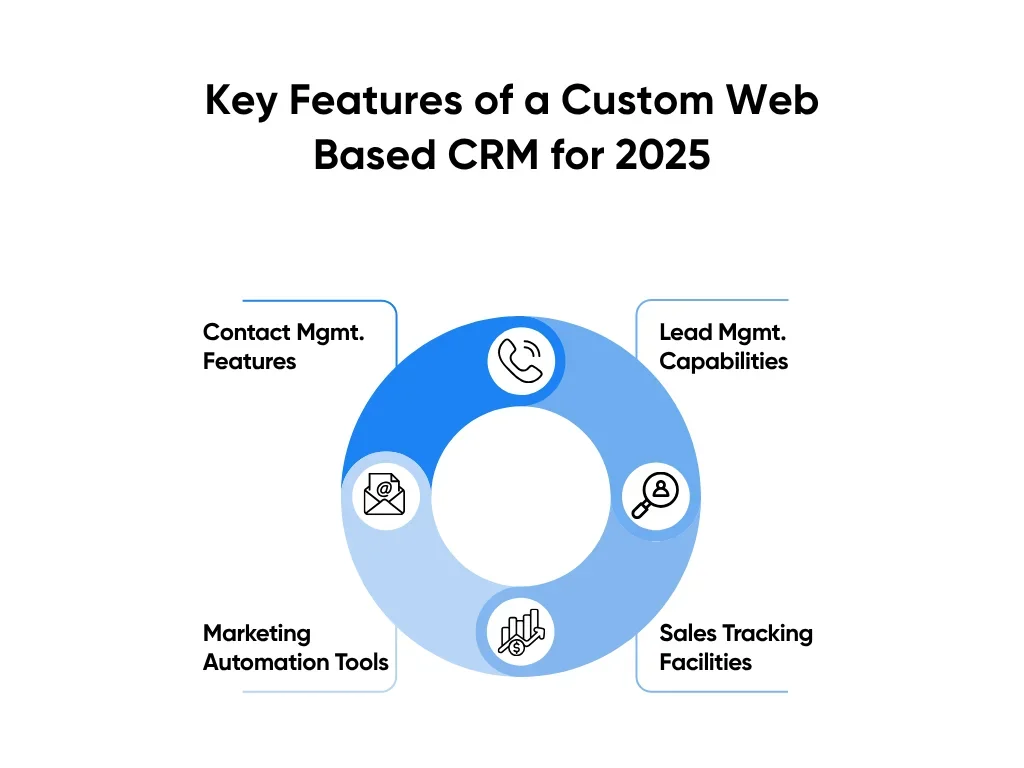
A well-designed CRM is a multi-functional tool for your business, customized to fit your specific processes and customer engagement strategies.
These features are not just beneficial; they're critical, enabling your business to harness the power of a personalized CRM solution fully. From enhancing your sales process to providing robust analytics, each component plays a role in creating a more streamlined, informed, and customer-focused business approach.
Contact Management Features
In a web-based CRM system, contact management is about keeping tabs on customer interactions and managing their information effectively. It's a tool businesses can leverage to keep detailed records of their contacts, monitor customer engagements, and store essential information like contact records, preferences, and buying history. Having all this data in one central place means businesses can quickly pull up any customer information they need.
Plus, these contact management tools give companies the power to categorize customers for more focused marketing efforts. This not only boosts customer service but also helps businesses make smarter decisions based on solid CRM data.
Lead Management Capabilities
Lead management features in a web-based CRM system are designed to streamline how you handle potential customers from the get-go. These tools help you grab leads, watch them, and ensure they're moving along your sales funnel. You can dish out leads to your salespeople, rank them to see who's most likely to buy, and dive into lead generation data to improve your approach. To scale prospecting beyond form fills, many teams pair their CRM with AI for lead generation to automatically discover, enrich, and prioritize qualified prospects.
Moreover, a sound CRM system can take over some of the heavy lifting with automation, sending out timely emails or reminders to keep leads warm, which can seriously boost your chances of turning them into paying customers. By tapping into these lead management capabilities of a small business CRM, you're setting your business up for a smoother sales process and, ultimately, better results.
Sales Tracking Facilities
Sales tracking features in a web-based CRM system are essential for businesses to monitor their sales pipeline and the overall sales process throughout the sales cycle.
This part of the CRM gives you live updates on how your sales are doing, which lets you see how well your sales team is performing. You can follow every sales action, deal, and revenue coming in, as well as have mobile access to this information through mobile CRM, which gives you a clearer picture for managing your sales better.
The CRM isn't just about tracking, though. It also predicts future sales and creates detailed reports, which is super helpful for understanding your sales trends and determine where you can improve. With these sales tracking tools, businesses can streamline their sales operations and make choices backed by solid data.
Marketing Automation Tools
Marketing automation tools within a web-based CRM system are a game-changer for running email marketing campaigns and generating leads. They take the repetitive tasks off your hands, like nurturing leads and sorting customers into groups so that you can focus on the bigger picture.
These tools also let you map out your customers' journey, giving each customer a tailored experience that could lead to better engagement and sales by utilizing insights from various social and business data resources and artificial intelligence. This creates a harmonious alignment between sales and marketing teams, ensuring that leads don't fall through the cracks and that customer engagement remains consistent and timely.
But it's not just about emails. These CRM features extend to managing your social media presence and other marketing initiatives. Plus, they're fantastic for keeping tabs on how your campaigns are doing, figuring out your return on investment, and tweaking your strategies for better results.
In short, marketing automation in your CRM is about working smarter, not more complicated, and seeing better results from your marketing efforts.
Challenges in Building a Web Based CRM Software and How to Overcome Them
Building a custom web-based CRM comes with its set of challenges, but with the right approach, these can be overcome. Here are some common hurdles and strategies to tackle them:
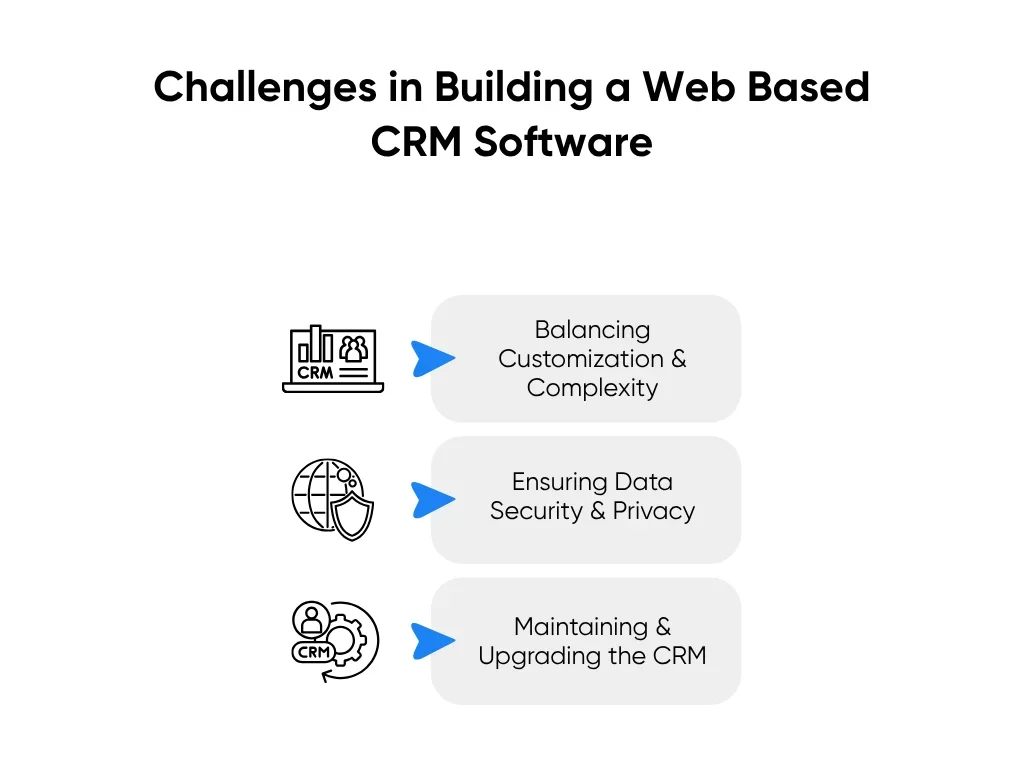
Balancing Customization and Complexity
Balancing customization and complexity in a custom web-based CRM software is a nuanced challenge that requires careful planning and execution. Customization is essential for aligning the CRM with the specific operational needs of a business, allowing for processes and workflows to be managed in a way that directly supports business objectives. However, each customization introduces additional complexity to the system, which can have several implications.
To address these challenges, businesses must prioritize which customizations are necessary for their CRM to meet core business needs. This involves a strategic approach to CRM design, focusing on streamlining operations and enhancing user productivity without over-complicating the user interface.
Involving end-users in the customization process can help ensure the CRM remains practical and approachable. Additionally, adopting an iterative approach to development, where features are introduced gradually and refined based on user feedback, can help balance customization and usability.
Ensuring Data Security and Privacy
Data security and privacy are the biggest challenges in building a custom web-based CRM software. The primary concern is safeguarding sensitive customer data against unauthorized access or breaches. Moreover, the threat landscape includes potential data loss or advanced system infiltration by malicious actors.
To mitigate these risks, a rigorous data backup system must be established, coupled with a comprehensive recovery plan to ensure your business continuity. Access control mechanisms are equally critical so that users have access only to the data and resources necessary for their role.
Compliance with regulatory frameworks such as the General Data Protection Regulation (GDPR) or the California Consumer Privacy Act (CCPA) is not optional. A custom CRM must be designed with these regulations in mind, incorporating features like data anonymization, audit trails, and consent management to ensure that the handling of customer data adheres to legal standards.
Maintaining and Upgrading the CRM
Maintaining a web-based CRM system is an ongoing process that requires diligence and foresight. Regular updates are critical, as they not only introduce new features but also address any security vulnerabilities that have been identified since the last patch or version was released.
It's essential to have a responsive development team on standby to troubleshoot and resolve any issues swiftly, minimizing downtime caused by internet connection issues and maintaining business continuity with the enterprise plan.
Frequent data backups are another cornerstone of a healthy CRM system. They safeguard against data loss due to hardware failures, cyber-attacks, or other unforeseen events. By ensuring that customer data is backed up, you protect not just your business's operational integrity but also the trust that your customers place in you.
Benefits of a Custom Web Based CRM vs Off-the-shelf CRMs
Selecting the correct customer relationship management (CRM) system is a pivotal decision for businesses of all sizes. Ready-made CRMs might seem appealing due to their quick setup. Still, they often lack the flexibility to meet the specific needs of your business and provide a personalized customer experience.
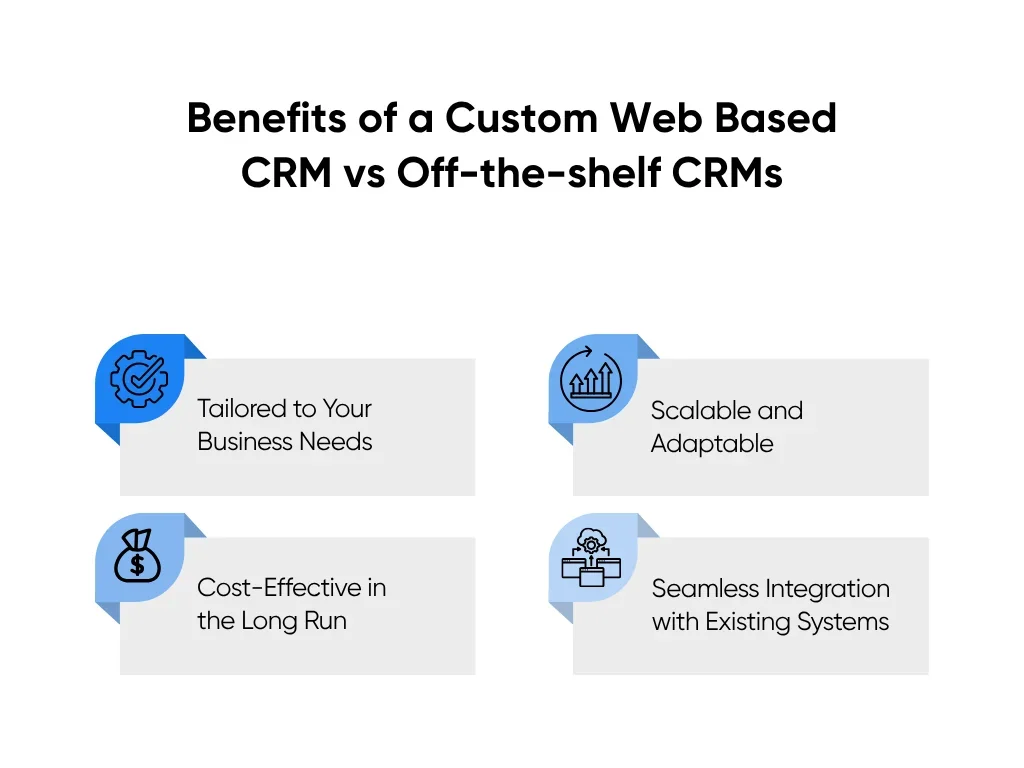
A custom web-based CRM, however, is built to align precisely with your business's unique processes and is built to scale with your growth, making it a better option than off-the-shelf customer relationship management software.
We'll discuss the top four advantages of choosing a custom web-based CRM over a standard, off-the-shelf solution. We'll demonstrate how a tailored CRM can streamline your operations, give you a leg up on the competition, and ultimately play a significant role in enhancing your profitability.
Tailored to Your Business Needs
A custom web-based CRM is essentially built to fit the unique demands of your business. It allows you to tweak features, workflows, and user interfaces to match your specific needs. Tailoring your CRM software enhances the user experience and simplifies interaction. Plus, it's designed to work with your existing business systems, allowing for a smooth data exchange.
This integration is vital to refining your distinct business processes, making them more efficient and aligned with your industry and business model. Moreover, a custom CRM is scalable – it's built to expand and evolve as your business grows, ensuring longevity and adaptability for the future.
Scalable and Adaptable
Scaling your business means your web-based CRM system must be able to keep pace with your growth. A customizable CRM offers the flexibility to evolve as your business needs change. It's essential to choose a CRM that can manage a growing volume of data without hiccups.
Plus, you'll want the ability to add new features and functions over time, ensuring that your CRM stays up-to-date with the latest trends in customer relationship management. This adaptability is critical to maintaining a CRM system that continues to serve your expanding business effectively.
Cost-Effective in the Long Run
Creating a custom web-based CRM system can be a smart financial move for your business in the long run. By sidestepping the continuous subscription fees that come with off-the-shelf CRM solutions and steering clear of features that don't serve your needs, you're setting up a cost-efficient framework.
This custom approach not only cuts down on the expenses of maintenance and support but also consolidates your investment, removing the need to juggle multiple CRM platforms.
In essence, with a custom web based CRM, you're investing in a system that grows with your business, ensuring that every dollar spent is on functionality that directly benefits your operations and offers various customization options for team members without the need for a significant investment in physical IT infrastructure or hiring IT staff.
Seamless Integration with Existing Systems
Integrating your web-based CRM system with your current customer data management tools is essential for a smooth flow of information. It's crucial to establish a hassle-free connection between your CRM and email marketing platforms to make your campaigns more efficient. Bringing in social media data can give you a fuller picture of your customer profiles.
Also, by syncing up interactions from your mobile app with your CRM, you get access to up-to-date customer data. These integrations not only boost the capabilities of your CRM but also streamline your business processes, making your operations more effective.
Key Takeaway
Embracing a custom web-based CRM system is a strategic move that can transform how your business operates. A tailored CRM gives you full control over workflows, recovering countless hours that you would have spent on manual data input.
As you build, focus on the essentials: flexibility, security, and scalability. In today’s landscape, AI integration is no longer optional. It is the key to unlocking smarter automation and predictive decision-making that gives your team a competitive edge.
Need help getting started? Explore how Aloa helps companies build custom internal tools and CRMs with AI at the core. From scoping to launch, our vetted teams and hands-on support ensure your CRM is built to scale and built to last.
Frequently Asked Questions
1. What is a web-based CRM and how is it different from an on-premise CRM?
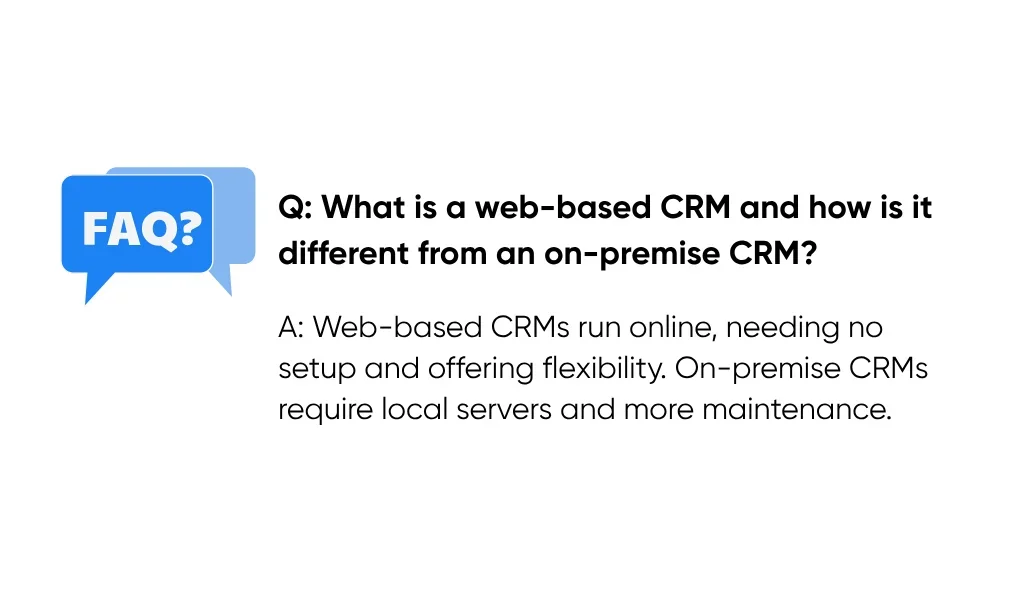
A web-based CRM is accessed through the internet and requires no local server installation. You can use it from any device, anywhere. On-premise CRM runs on your own servers. It often needs more setup and maintenance. Web-based CRMs are more flexible and scalable. They are good for remote or growing teams.
2. How do I choose the right web-based CRM for my business?
Here are our recommended steps:
- Start by listing your business needs and goals.
- Compare CRM features, integrations, and user limits.
- Check if the CRM fits your workflows.
- Look for good support and security.
- Test with a free trial or demo.
3. Are web-based CRMs secure for storing sensitive business and customer data?
Yes, most web-based CRMs use strong security measures. They use encryption and frequent security updates. Look for compliance with standards like GDPR or HIPAA. Your team should use strong passwords and access controls.
4. What features should I look for in a web-based CRM?
Look for contact and lead management tools first. Automation and reporting are very helpful. Mobile access is key for remote teams. Integrations with email and calendar boost productivity. Custom fields and workflows help match your business processes.
5. Can a web-based CRM integrate with tools I already use (like email, calendar, or marketing platforms)?
Yes, most web-based CRMs offer integrations with popular tools. You can link email, calendars, and marketing systems. This helps your data stay in sync. Integrations reduce manual work and errors.
6. How much does a web-based CRM cost, and are there free options?
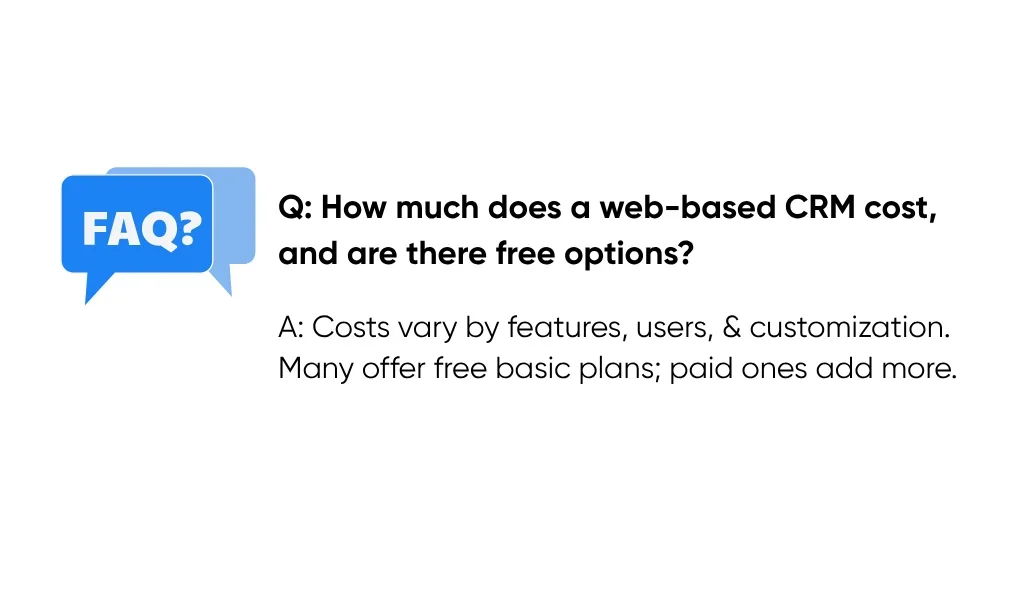
Costs depend on features, users, and customization. Many CRMs have free basic plans. Paid plans add advanced features or more users. Custom CRMs cost more but fit your needs exactly.

